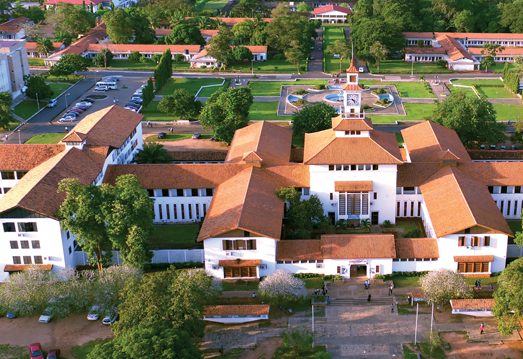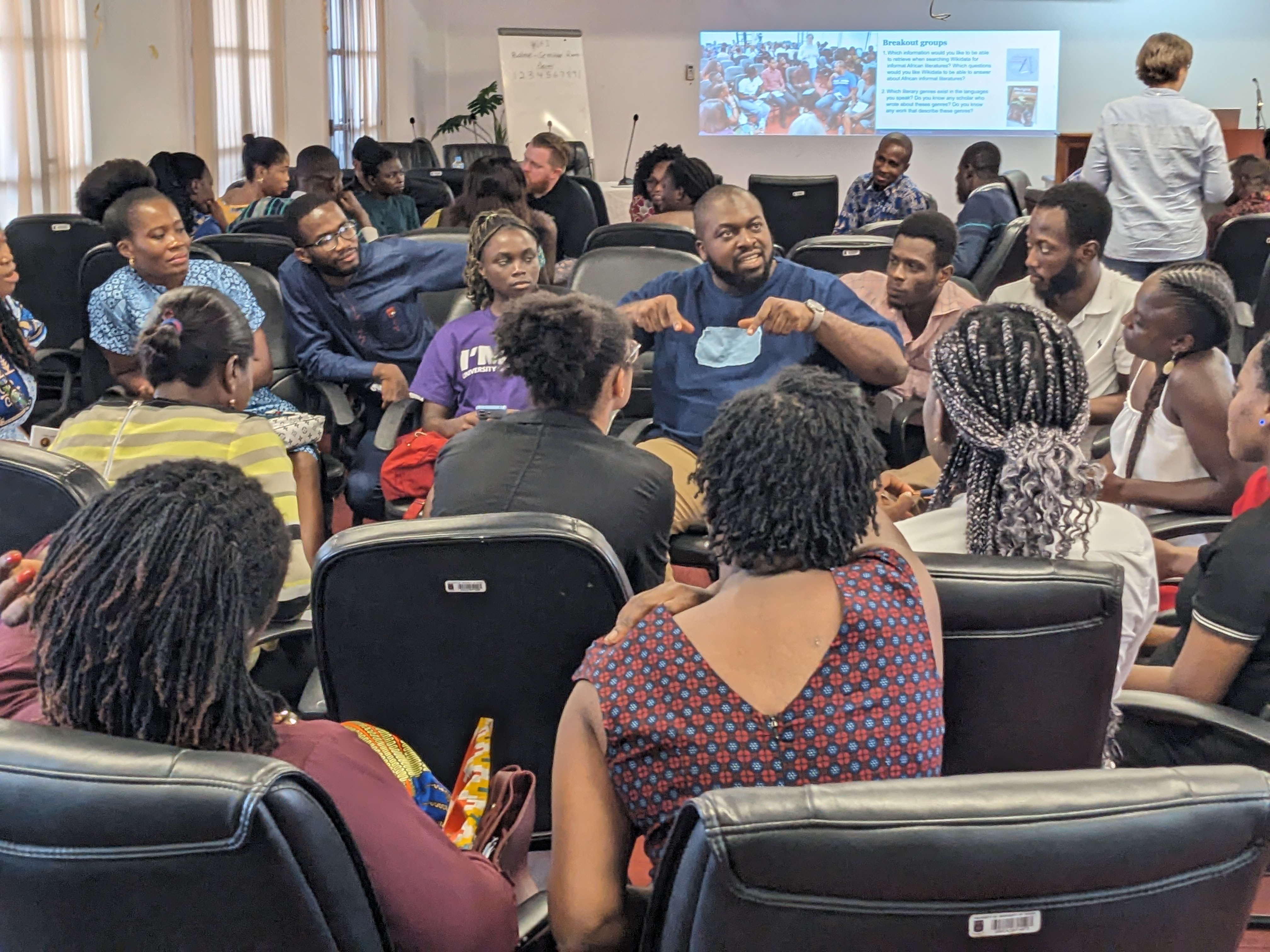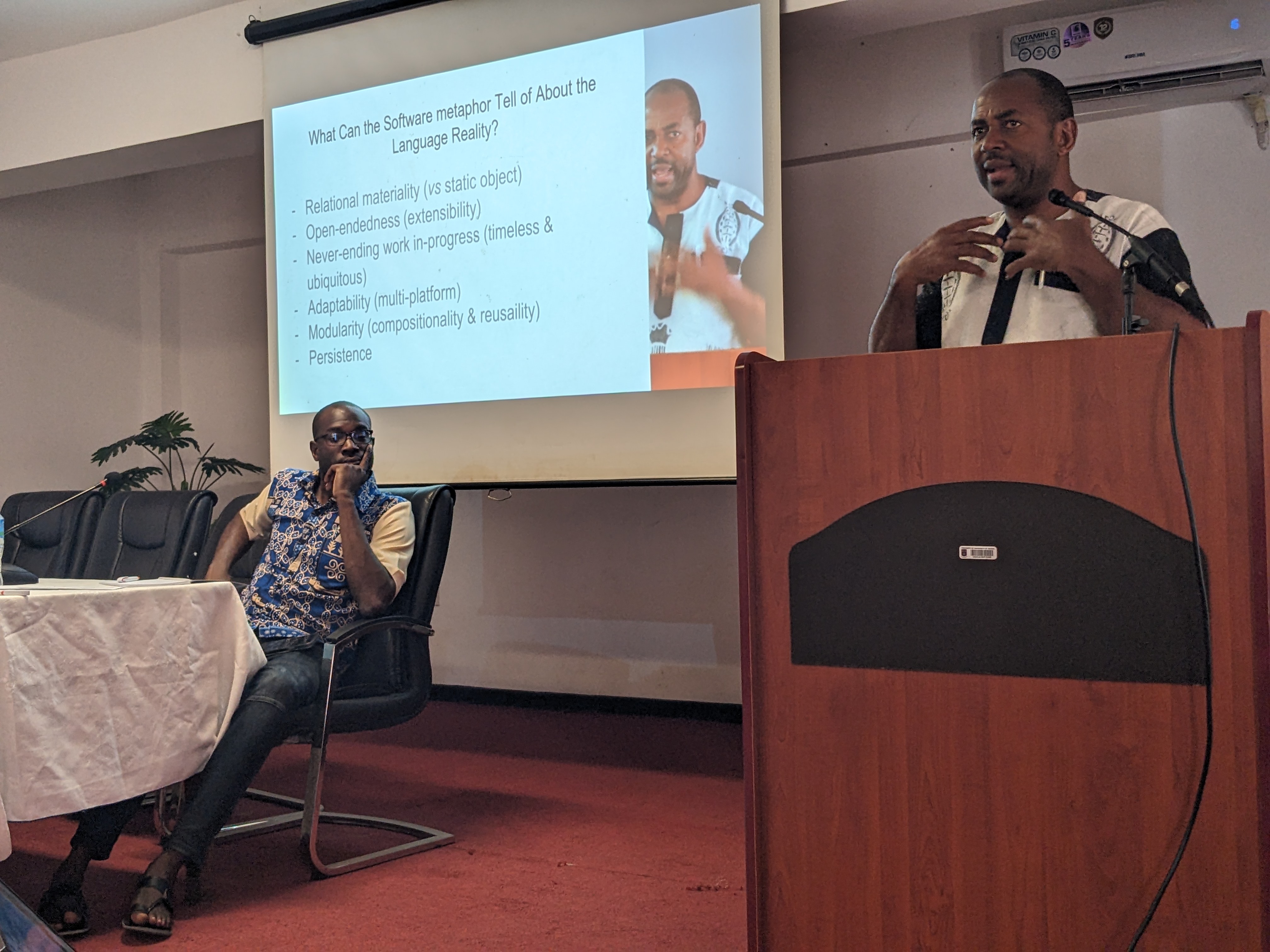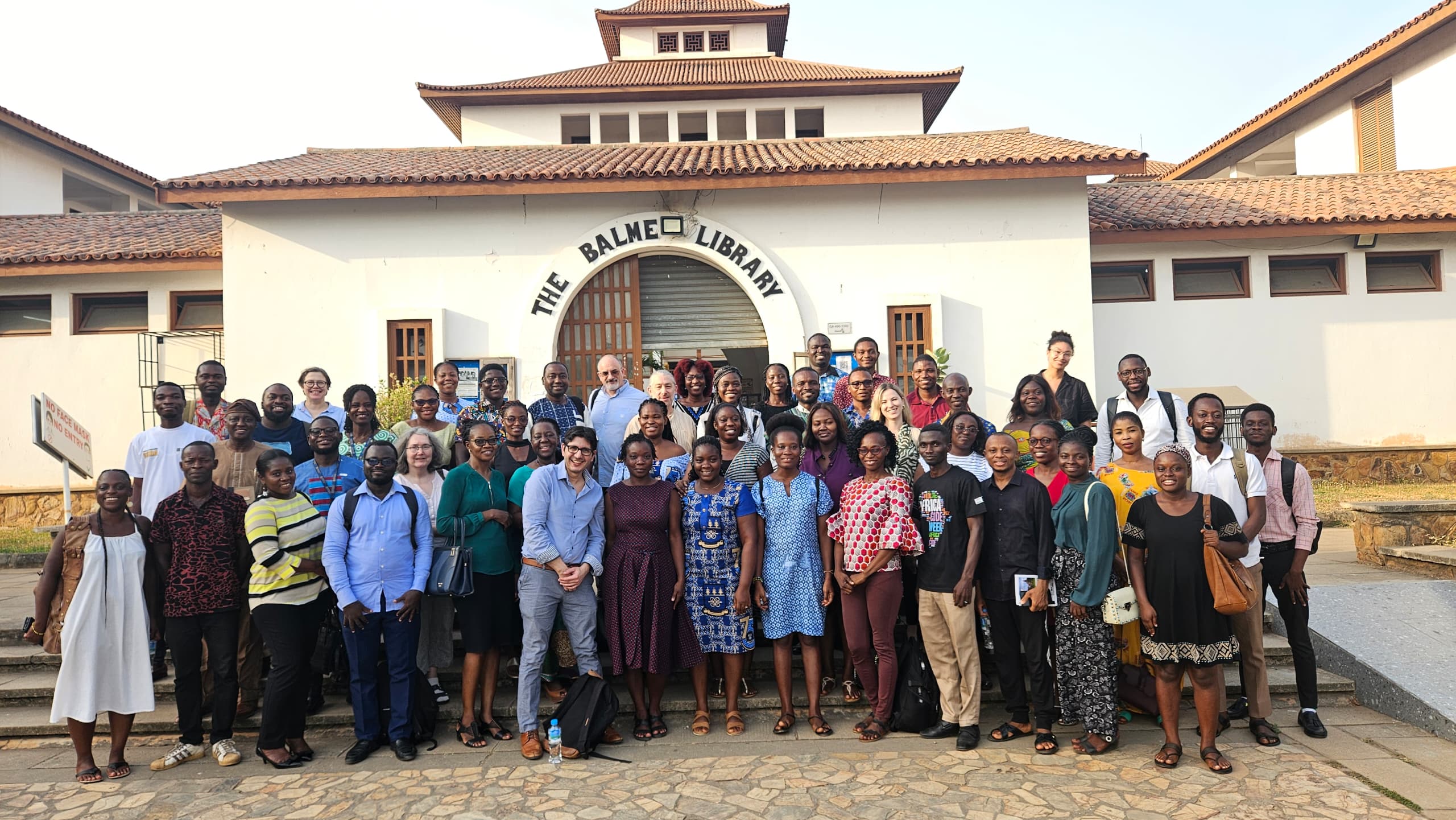The 2024 DH Symposium at the University of Ghana:
A Report

Slides and Presentations
Presentation Slides
YouTube Livestream: Day 1 / Thursday
YouTube Livestream: Day 2 / Friday
Overview
Building upon the success of the previous three symposiums held online, the 4th African Digital Humanities Symposium, held February 15-16, 2024 at the Balme Library at the University of Ghana (UG) campus in Accra, Ghana, marked an exciting transition to a hybrid format, combining both in-person and virtual participation. The event brought together 18 speakers from 12 countries for two days of workshops, presentations, and informal discussions about digital humanities in the African context. Panels and presentations addressed topics such as digital archives, culture and ephemera, language preservation, artificial intelligence, and digital humanities infrastructure. More than 100 participants–Ghanaian graduate students from humanities disciplines, library and archives professionals, scholars and other interested parties–attended in person and more than 125 joined online.
The symposium marked a milestone in the international partnership between the University of Kansas and the University of Ghana, as they joined forces to organize and host the event. Spearheading the initiative from KU were James Yeku (African & African American Studies) and Brian Rosenblum (KU Libraries). They crafted the program’s framework and content, setting the stage for a rich, intellectual discourse. Concurrently, the local expertise of Akosua Darkwah (Dean of the School of Information and Communication Studies), Patience E. Ocloo Dzandza (Information Studies) and Kwabena Opoku-Agyemang (English), among others at the University of Ghana, ensured a smooth orchestration of the event’s logistics. James Yeku, who leads the AfricanDH@KU program, lauded the collaborative nature of the symposium. “The University of Ghana’s partnership with KU provides a solid template for envisioning South-North collaborations in digital humanities and other areas of scholarly cooperation,” said Yeku.
This successful collaboration was bolstered by generous support from multiple units at KU, including the Institute for Digital Research in the Humanities, KU Libraries, the Kansas African Studies Center, the [Department of African & African-American Studies](https://aaas.ku.edu], the Center for Cyber-Social Dynamics, and the History of Black Writing. External contributions from the ALMEDA Project at Uppsala University in Sweden, and the South African Center for Digital Language Resources added to the global dimension of the event, underscoring its significance and reach. The organizers were pleased to be able to award $250 stipends to ten Ghanaian graduate students to enable to travel to Accra to attend the event.

The Program
An opening discussion on minimal computing by Alex Gil stressed the importance of integrating local African experience and needs into digital humanities work, and urged participants to be proactive, teach themselves, and learn by doing, rather than waiting for external instruction. Hands-on, introductory workshops covered provided opportunities for interactive learning. Randa El-Khatib led a session on building mapping and geospatial projects, while Malkia Okech, representing the African Digital Heritage initative, led participants through a methodology for developing community-oriented digital cultural heritage projects.
The panels and keynote talks covered a wide range of projects, challenges, and concerns. The Digital Archives panel showcased three large-scale digitization projects. Fu’ad Lawal discussed the vision and the challenges faced by Archivi.ng, his start up project to digitize decades of Nigerian daily newspapers and democratize access to Nigeria’s historical record; Siaka Fadera described the work by The Gambia’s National Centre of Arts and Culture to digitize 5,000 recordings of oral histories, proverbs, music, and stories, complete with transcriptions, translations, cataloging and cross-referencing; and Judith Opoku-Boateng explored how digital archives can fill an imporant research gap, an effort she is undertaking by digitizing thousands of recordings and photographs of Ghana’s rich traditions of dance and drumming at the University of Ghana’s J.H. Kwabena Nketia Archive.
The Culture and Ephemera panel highlighted other approaches to providing access to cultural materials. The ALMEDA (African Literary Metadata) project, led by Ashleigh Harris at the University of Uppsala in Sweden, is focusing on developing a new, multilingual metadata ontology and a linked open database for the large body of oral, expressive culture that is a major part of literary culture in Africa. Harris, Ursula Oberst and the rest of the ALMEDA team later led a 1/2-day workshop on data modeling of oral literary forms in Wikidata. Karen Ijumba, senior researcher at Open Restitution Africa, advocated for the value of smaller, more narrowly focused, curated projects that can provide contemporary value to a specific audience. An example of this approach is her Poetry African Digital Map, which visualizes the trajectories of contemporary African poets and poetry festivals, providing a useful and important resource for poets and festival organizers, while giving poets and their work more visibility. Kodjo Atiso, from the University of Kansas Libraries, emphasized the significance of preserving neglected collections, exemplified by his efforts to digitize a pre-colonial herbarium in Ghana, valuable for preserving cultural-medicinal knowledge as well as for discussions on ecosystem preservation.
With 1,000 to 2,000 or more languages spoken on the continent, the complex relationship between language, technology, and culture was a major underlying theme of the symposium, with a particular focus on preserving mother tongues. The Languages panel explored this topic in more detail. Augustin Ndione, director of the Dakar Center for Applied Linguistics in Senegal discussed efforts to digitize important for language instruction. Emmanuel Ngue Um of the University of Yaounde 1 in Cameroon, used the metaphor of language as software to advocated for encoding both formal and relational aspects of language in order to more accurately represent the diverse linguistic reality in Africa. Alex Gil’s comments (video) reflected a concern about linguistic colonialism, in particular as related to artificial intelligence and its implications for language preservation. Will AI lead to the further marginalization of mother tongues, or will it help in preserving those languages? Overall, the panel served as a call for thoughtful and inclusive approaches to language preservation that prioritize cultural sensitivity, respect linguistic diversity, and recognize the limitations of digitization efforts.
The Artificial Intelligence panel explored these themes further. Kwabena Opoku-Agyemang observed (video) that the large language models that provide the foundation for AI have a dearth of writing about Africa from an African perspective, in part because so much of African culture is transmitted orally. AI models thus reinforce and perpetuate biased, stereotyped, or inaccurate information about African culture and history. Kọ́lá Túbọ̀sún, founder of the Yorùbá Name Project, an online intervention to preserve and document all Yorùbá names in a multimedia format, noted some potentially promising uses of AI for African languages, such as conlanging, speech recognition tools, machine translation, and the creation of online repositories of languages. More local funding, engagement with Western development of AI, and attention to collective action can help advance African-centered AI. Meanwhile, Oluwaseun Sanwoolu, a PhD student in Philosophy at the University of Kansas, offered thought-provoking insights about the psychology and ethics of humans forming intimate personal relationships with AI applications.
Finally, the symposium featured case studies of four DH centers or initiatives from different geographical regions–the Digital Humanities Institute-Beirut in Lebanon, the Center for Digital Humanities at the University of Lagos in Nigeria (CEDHUL), led by Tunde Ope-Davies, the South Africa Center for Digital Language Resources (SADiLaR), and the Institute for Digital Research in the Humanities at the University of Kansas (presented by Randa El Khatib, Tunde Ope-Davies, Menno van Zaanen, and Brian Rosenblum, respectively). These four initiatives have unique approaches based on their geographical, cultural, institutional, and financial contexts, but they share many common goals and activities—a commitment to building community, providing training, and providing space for sharing and discussing pressing issues in DH research. They can provide models for others to adapt.

Looking Forward
The symposium concluded with reflections from the speakers and participants on how to keep these critical conversations going and build a network of support and collaboration for African-centered digital humanities initiatives. Key strategies included:
-
strengthening connections between African DH initiatives—those presented here and the many other initiatives and projects underway across the continent;
-
organizing future online and in-person meetings and opportunities for learning and sharing of research and best practices;
-
capacity building to develop a stronger technical, social, and intellectual infrastructure for digital humanities work;
-
and establishing channels for disseminating DH knowledge and resources, such as directories of African-related DH projects, or a peer-reviewed publication for sharing research.
The ultimate goal is not just to advance the field of digital humanities in Africa, but to develop an African-centered digital humanities that is founded on a shared commitment to preserve linguistic diversity, safeguard and make accessible cultural heritage, and facilitate engaged uses of technology and cultural materials that are sensitive to local contexts and practices.
We look forward to seeing you at the 5th African DH Symposium in 2025!

